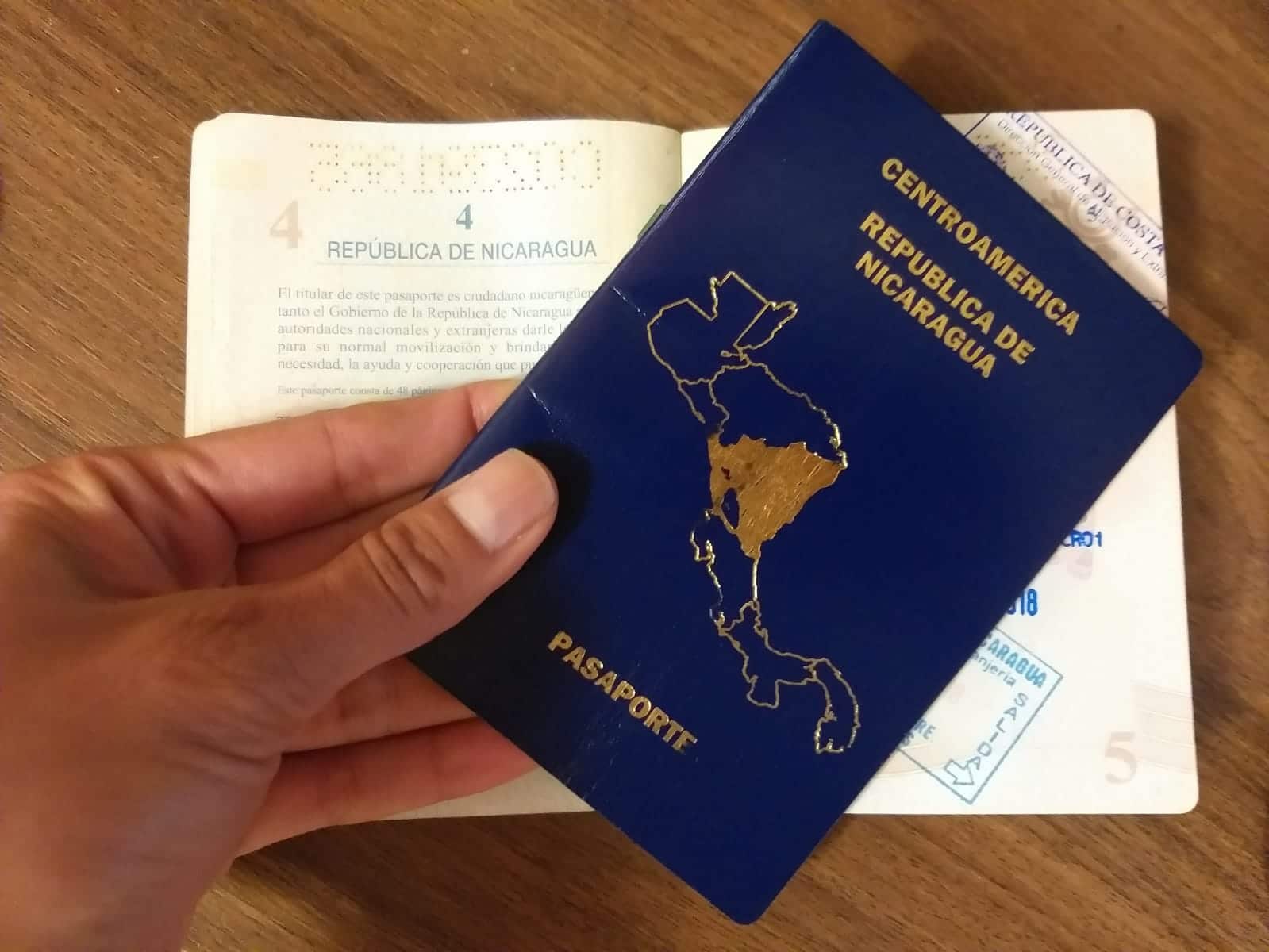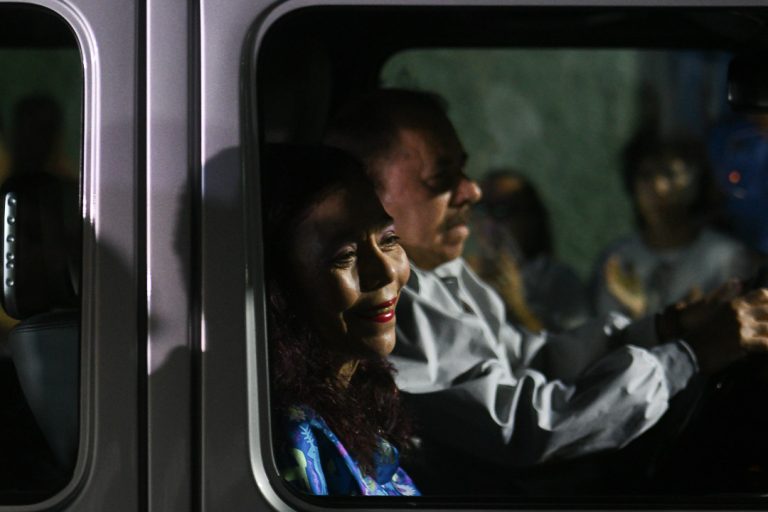5 de diciembre 2016

Nicaragua: Public Employees Hindered from Traveling to USA

PUBLICIDAD 1M
PUBLICIDAD 4D
PUBLICIDAD 5D
“The militarization has shown that in the face of a democratic opposition, the authoritarian regime can only govern with more repression.”

Rosario Murillo y Daniel Ortega, después de votar en noviembre pasado cerca de El Carmen, en Managua. Carlos Herrera/Confidencial.
HAVANA TIMES – The general repression unleashed by the Ortega-Murillo regime to impede a rural mobilization headed to Managua represents the family dictatorship’s second great political defeat this year, following the national protest expressed by massive abstention in the November elections.
The recently reelected leader, who supposedly received the overwhelming support of 72% of the electorate, has demonstrated that although he maintains an iron control over the police force - now led by Gen. Francisco Diaz, father-in-law to one of the Ortega children - he can’t tolerate the existence of a democratic opposition.
Ortega stationed dozens of riot squad police along the principal highways of the country, virtually imposing a national state of siege. He blocked the exits from the rural communities and the entrances to the capital to impede a peaceful protest march, the 82nd one for the rural movement whose goal is the repeal of the canal law and the celebration of free elections.
As in the era of Somoza’s National Guard, the police searched the buses to detain “suspect persons” and employed rubber bullets and tear gas against the protesters. In the rural communities of the department of Nueva Guinea, the focal area of the protest, they reached the extreme of blocking the highways and destroying bridges, national infrastructure used by all, just to stop the passage of the trucks with the protestors.
This unbelievable act illustrates just how isolated from reality the presidential couple have become. In their eagerness to apply a hateful repression, they don’t mind resorting to official vandalism, even at the price of causing damage to the entire society. But it also reveals the dangerous level that the repression in Nicaragua can reach. Not only do those who exercise power lack all ethical and moral scruples, but also there are no legal or institutional limits or checks and balances in the way of their ambition and irrationality; the only force that can put the brakes on them is the force of the people who put up resistance.
The militarization demonstrates that when faced with a democratic opposition - in this case a social movement that has managed to embody the national yearning for sovereignty and free elections - the authoritarian regime can only govern with more repression.
The stability that Ortega offers the large business owners and investors who are his allies is therefore precarious, because it’s not based on democratic consensus. It’s an authoritarian stability based on the cudgel, and in the long run, this, like the corruption, leads to instability.
So, if the owners of large companies are truly concerned about the deterioration of the business climate and the threatened Nica Act [in the US Congress], they should begin by demanding democracy and transparency, as well as freedom of movement and an end to repression.
The national day to demand sovereignty and free elections has achieved an irreversible political result. In the first place, it’s brought national recognition of the leadership role played by the farmers grouped around the National Council in Defense of the Land, Lake and Sovereignty, which represents the first line of defense of the national decency. The rural resistance has forced Ortega to expose himself to the Organization of American States (OAS) as not only a devious strongman who stages electoral farces with neither competition nor electoral observation, but also as the boss of a repressive regime that has infringed the population’s most basic civil and political rights.
As a result, the violations of all the political rights contemplated in the Democratic Charter should now be prioritized in the agenda for the political dialogue between the OAS and the government. According to Secretary General Luis Almagro, this dialogue has been broadened to include all the political and social forces of the country. The country is demanding free elections with full political liberties, beginning with freedom of opinion and movement. In other words, free elections without repression.
In a symbolic gesture of enormous political resonance, the Secretary General of the OAS received Francisca Ramirez, the leader of the peasant movement, when she managed to break the police siege and reach the capital. Almagro heard the most authentic account of the violations of political and social rights practiced by the Ortega regime in its dark alliance with Chinese businessman Wang Jing. However, it would be wrong to expect that within ninety days of dialogue, the OAS could offer a solution to the country's internal problems, or replace national political forces and their responsibility to build a platform for peaceful democratic change. The only thing we can expect from the OAS is that it truly subjects the Ortega regime to an element of accountability on its international obligations and commitments with the Democratic Charter. That is what Almagro has promised, but the restitution of the right to free elections does not depend on the OAS but on popular pressure and mobilization. The twinning of social movements and political opposition in recent weeks is opening a new path, which Ortega will try to crush with more repression and fear of instability.
This article has been translated from Spanish by Havana Times.
Archivado como:
PUBLICIDAD 3M
Periodista nicaragüense, exiliado en Costa Rica. Fundador y director de Confidencial y Esta Semana. Miembro del Consejo Rector de la Fundación Gabo. Ha sido Knight Fellow en la Universidad de Stanford (1997-1998) y profesor visitante en la Maestría de Periodismo de la Universidad de Berkeley, California (1998-1999). En mayo 2009, obtuvo el Premio a la Libertad de Expresión en Iberoamérica, de Casa América Cataluña (España). En octubre de 2010 recibió el Premio Maria Moors Cabot de la Escuela de Periodismo de la Universidad de Columbia en Nueva York. En 2021 obtuvo el Premio Ortega y Gasset por su trayectoria periodística.
PUBLICIDAD 3D